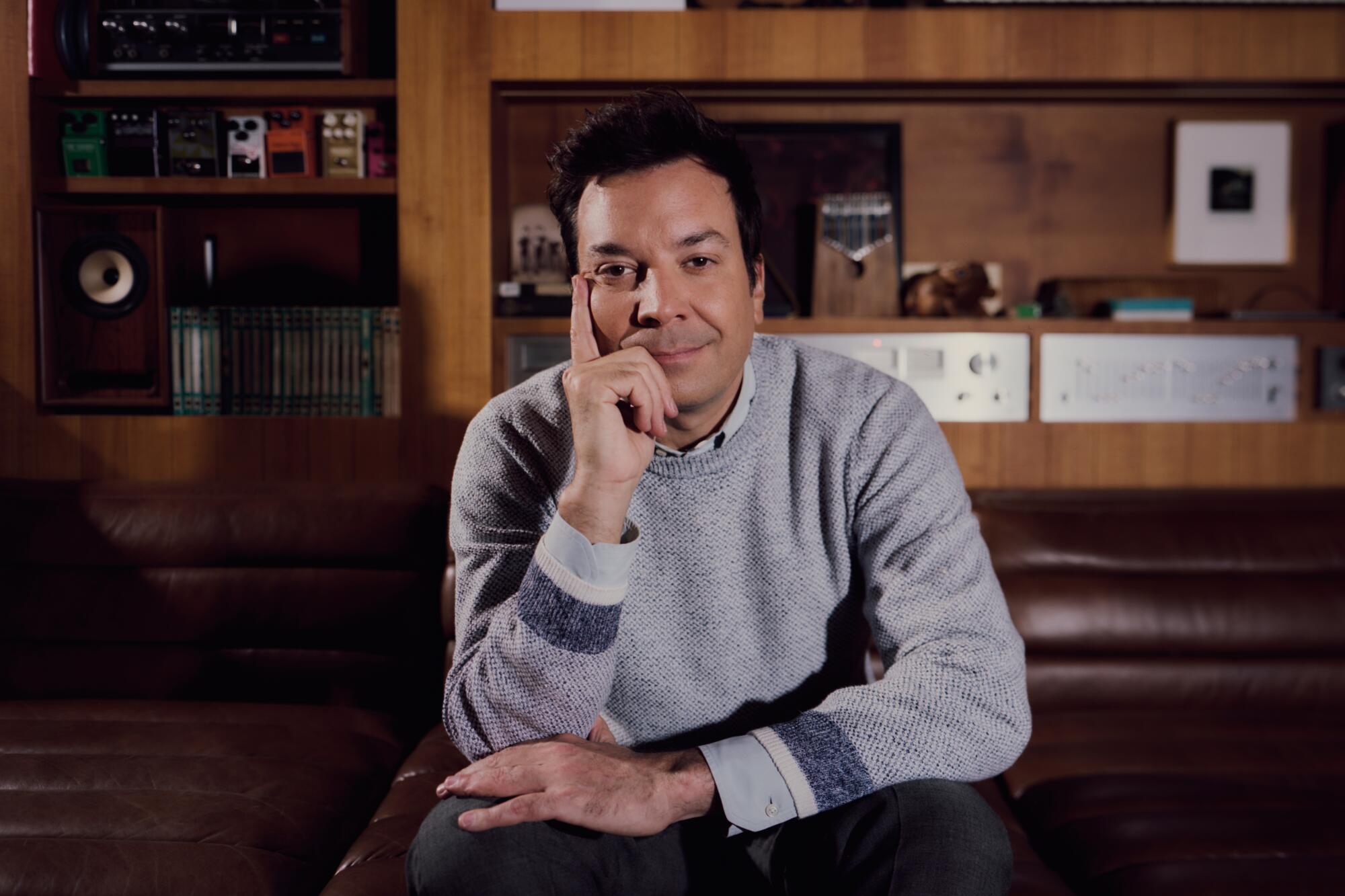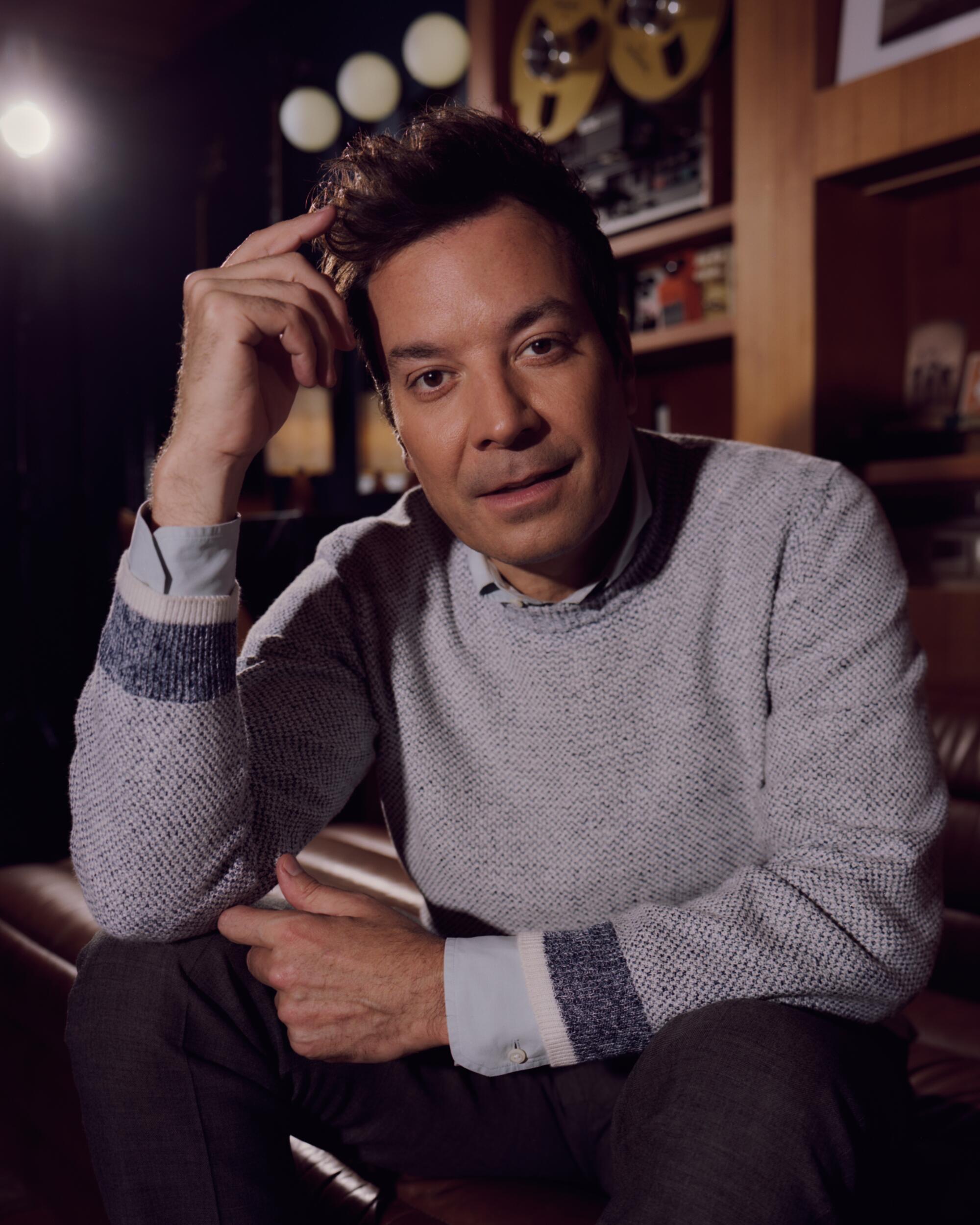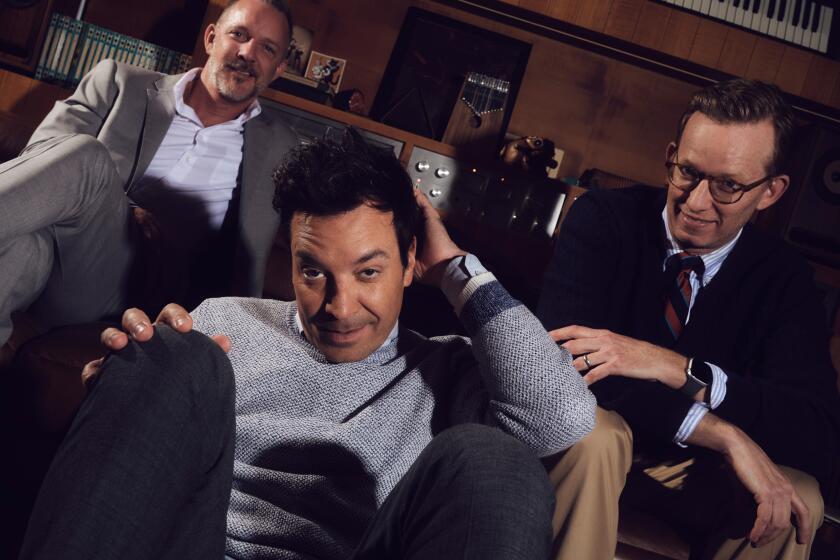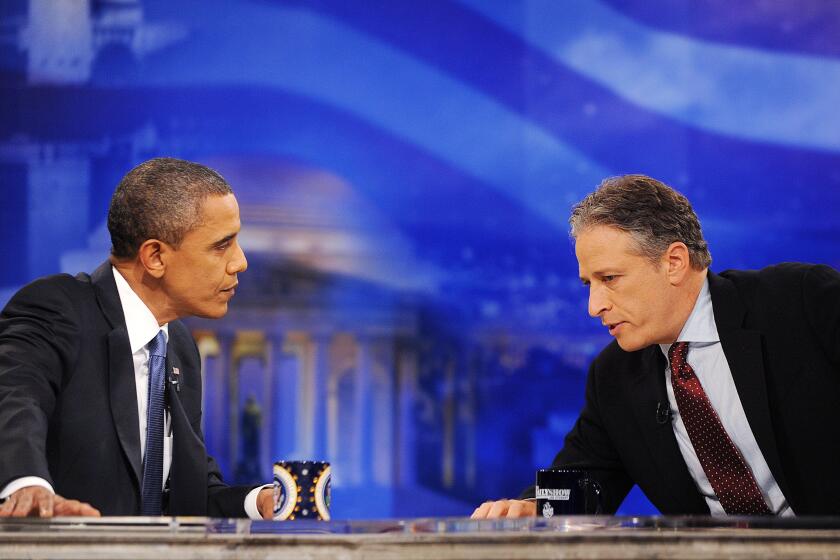
- Share via
New York — Hosting “The Tonight Show” for 10 years is a milestone worth celebrating, as Jimmy Fallon recently did with a special on NBC. But his tenure at the network actually spans 26 years: “Saturday Night Live” (1998-2004), “Late Night With Jimmy Fallon” (2009-14) ; and “Tonight” since 2014. In another decade, he’ll top Jay Leno’s run; he’ll need another 20 to surpass Johnny Carson as the longest-running host of the 70-year-old series.
Does Fallon have that much in him? So far, he’s navigated bad press (for being playful with then-presidential candidate Donald Trump in 2016) and backstage scandal (a reportedly “toxic” writers’ room atmosphere in 2023) — but his numbers are promising: “Tonight” has nearly 100 million followers across social media, and its digital content has drawn 2.2 billion views across those platforms.
These days, Fallon seems relaxed, savvier and confident about captaining his late-night ship. He’s settled into his place in the world in a 30 Rock corner office, decorating it accordingly: stained-glass Buddy Holly window, fish tank, family snapshots, photo of himself brushing his teeth with Paul McCartney. He spoke with The Envelope from that office about finding his footing, why late night matters — and getting through the next show.
Showrunner Chris Miller walks us through a typical day’s schedule putting together ‘The Tonight Show Starring Jimmy Fallon’
You were very experienced before taking over “Tonight,” but Lorne Michaels still had to go to bat for you. Did you ever ask him why?
I just think he believes in me. He knows if he hands me the ball, I’ll do whatever I can to score. I work hard and I practice and I just want to make sure it’s done as best as possible.
Are you a perfectionist?
I think so. When I started, everything had to be tickety-boo. But as the years have gone on, I’m more open to things falling down and dealing with that in the moment.
TV as a medium is undergoing a lot of changes. So what is the purpose of late-night shows?
They’re an escape from reality, No. 1; No. 2, it’s necessary for pop culture to show you what’s out, what people are talking about. There’s art out there that needs to be amplified. But it’s also an escape. You can be in your pajamas and choose to watch it and go, “Make me laugh, entertain me.” That’s how I remember Johnny Carson when I was growing up.
Back in the day people used to joke that “Tonight” was often the backdrop for conception.
So that’s a third reason. We’re increasing the population of Earth.

When I started, everything had to be tickety-boo. But as the years have gone on, I’m more open to things falling down and dealing with that in the moment.
— Jimmy Fallon
How have you grown as an interviewer?
When I first started, I was so nervous. I kept going so fast in my interviews, and they’d be like, “We’ve got two more minutes left,” and I’d be like, “I already asked all my questions.” Now it’s the opposite. I’m in a real conversation, asking questions I probably wouldn’t have back then. I listen to [Marc] Maron, Howard Stern, all these long [podcast] interviews, and I think it’d be great to talk to somebody a lot longer.
David Letterman is also doing long-form interviews with his Netflix shows. I remember when he hosted “Late Night,” there was this sense of spontaneity and anarchy about the show. But in the L.A. Times recently, critic Robert Lloyd tsk-ed that late night has become a promotional mill. How do you avoid that label ?
But did Letterman’s show change and become more of that promotion [mill]?
Once he started “The Late Show,” sure. It was a time change and he had a bigger platform. But does “Tonight” always have to be a shiny —
There’s always a gloss on “The Tonight Show.” I do think I get away with it in sketches. You never know when I’m going to do a song or a sketch, and that’s normal. We try to mix it up. I think I try to keep it spontaneous, in that anything could happen.
Though streaming and social media have upended how viewers consume late-night series, innovation on the shows themselves has been much more stagnant.
Does it take 10 years to get to where you are now with “Tonight”?
It does. The only thing that can get you there is age and time, and to keep going. You can’t do it in a week; it doesn’t happen fast. This is what happens when you get to this age, you’re like, “We earned this, we built all this, we built a great machine here, it’s really fun,” and there’s no other way to get there but experience.
Are there any guests you regret having on?
No. Every day is a different experience. Sometimes you have great shows, and sometimes you’re like, “That was really hard.” Either way, you can’t get too excited or too depressed because you have another show tomorrow and another show tomorrow — and another show tomorrow.
More to Read
From the Oscars to the Emmys.
Get the Envelope newsletter for exclusive awards season coverage, behind-the-scenes stories from the Envelope podcast and columnist Glenn Whipp’s must-read analysis.
You may occasionally receive promotional content from the Los Angeles Times.








